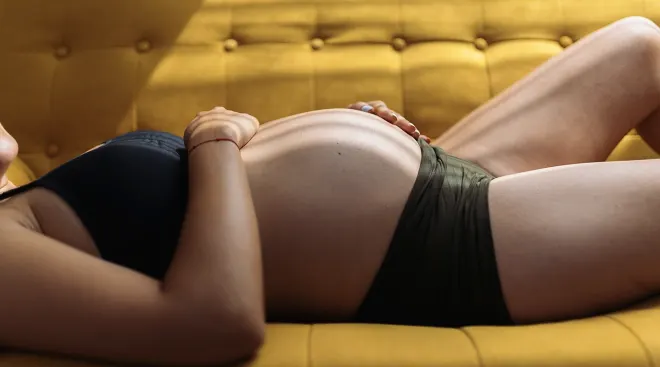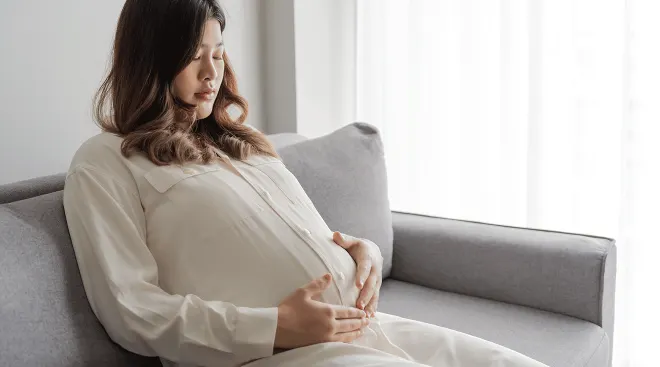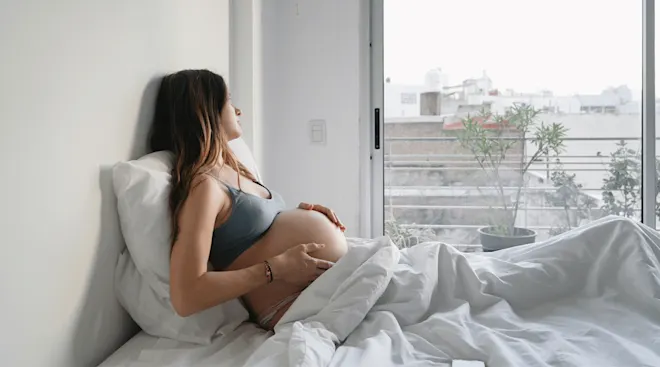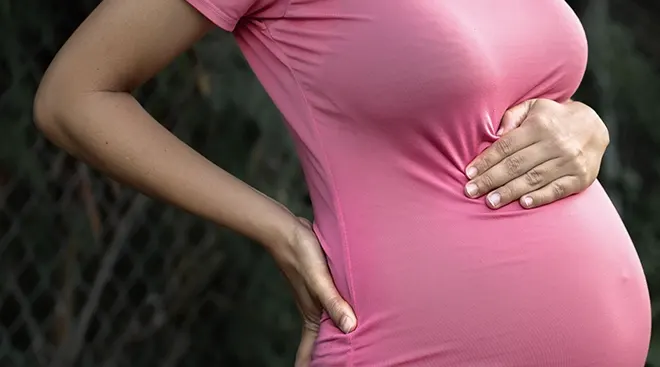Why Do I Pee When I Cough or Sneeze During Pregnancy?
Pregnancy is a roller coaster ride of bizarre symptoms, some of which can be downright embarrassing. (Hello, pregnancy gas.) If you find yourself peeing when sneezing in pregnancy (aka “snissing”)—or peeing when coughing—you’re not alone. But is it normal to pee when you sneeze or cough while pregnant? Experts assure us that it’s generally very normal. You might be curious, however, why this happens—but most importantly, how to make it stop. (You don’t exactly love carrying extra underwear around, after all.) Here, learn what you need to know, including the best exercises to help with pregnancy incontinence.
Pregnancy incontinence can be just as much a part of expecting baby as your topsy-turvy mood swings or those wild cravings. And sneezing or coughing aren’t the only things that might cause you to pee a little, says Sherry Ross, MD, an ob-gyn, author, and co-founder of Oneself Intimate Skin Care and the Women’s Health & Wellness School on the MprooV app. “It’s very common for pregnant women to suffer from loss of urine … while exercising, walking, laughing, sneezing, coughing and during sexual activity,” she says. In fact, around 40 percent of people experience pregnancy incontinence, according to Cleveland Clinic.
Typically, pregnancy incontinence happens as a result of your growing uterus putting increased pressure on your bladder and pelvic muscles, says Ross. Hormone changes during pregnancy can also cause the pelvic floor muscles that hold your bladder to loosen and weaken, which can make it harder to “hold it,” says Cleveland Clinic.
Peeing when sneezing or coughing in pregnancy is most common in the third trimester, when baby’s putting the most pressure on your bladder, says Cleveland Clinic. But pregnancy incontinence can happen anytime, says Ross. “Urinary incontinence can occur as early as the first trimester and continue throughout the entire pregnancy, and during the first few months of the postpartum period,” she says.
You’re likely wondering: How can I stop peeing when I sneeze and cough while pregnant? There are various exercises and lifestyle modifications for pregnancy incontinence, according to experts. They include:
-
Kegel exercises. Kegel exercises help train your pelvic floor muscles, says Jessica McKinney, PT, DScPT, MS, vice president of clinical affairs and global health at Axena Health. When properly contracting in a Kegel, “the pelvic floor muscles produce a combined action of squeezing and lifting up and in, as if drawing up toward the belly button or the back surface of the pubic bone,” she explains. “This is similar to the muscle action that would stop the flow of urine or holding back gas, but you don’t want to practice the exercises by actually stopping the flow of urine on a regular or repeated basis.” She suggests starting with three-second repetitions, taking an equal amount of rest between repetitions; make sure to relax fully. Perform 10 repetitions three times daily, building up until you can both hold and relax for 10 seconds. She adds that it’s helpful to exhale during the exercise, “ideally blowing out gently through pursed lips, as if through a straw.”
-
The Knack exercise. The Knack is an exercise “to help manage and retrain your pelvic floor muscles to reflexively engage during increases in intra-abdominal pressure, like coughing or sneezing,” explains Kerry Kelley, PT, DPT, head of the pelvic health program and clinic manager at Marathon Physical Therapy and Sports Performance in Norwood, Massachusetts. To do it, first inhale through your nose. Then, exhale through your mouth and contract your pelvic floor muscles (as in a Kegel). As soon as your muscles are engaged, cough. Then, relax your muscles again.
-
Building core strength and control. Building core strength, control and mobility is essential to keeping yourself from peeing when sneezing or coughing during pregnancy, says Kelley. This includes exercises that strengthen your pelvic floor muscles, abdominals, diaphragm and lumbar spine muscles, she says. “A physical therapist can provide specific exercises and interventions based on your individual needs,” she adds.
-
Keeping a bladder log. “A bladder diary is helpful to figure out your fluid intake and track the instances of leaking,” says Kristin Sapienza, PT, DPT, a physical therapist and the founder of FemFirstHealth in New York City. Keeping a log will help your healthcare provider develop a treatment plan, adds Ross.
-
Decrease caffeine, spicy foods and chocolate. All can irritate the bladder mucosa, making it harder to hold your pee. Make sure you stay well hydrated and empty your bladder regularly, adds Ross.
-
Eat high fiber foods. Among other important reasons to eat fiber during pregnancy, it can reduce constipation—which can take a toll on your bladder when you’re straining to poop and lead to leaks, says Cleveland Clinic.
When pregnancy incontinence “disrupts your everyday routines or affects your quality of life,” it’s time to check in with your healthcare provider, says Ross. They can recommend treatments like physical therapy.
Sapienza says that it’s best to see a pelvic floor physical therapist right away when you experience peeing when sneezing or coughing in pregnancy. “A pelvic floor physical therapist can examine all of the muscles of the pelvic floor and determine what muscles are tight or weak,” she says. “They can further determine how coordinated the muscles of the pelvic floor are and provide feedback to make sure you’re doing pelvic floor contractions properly.”
According to Cleveland Clinic, pregnancy incontinence typically resolves three to six months after giving birth. But sometimes, it can persist or even come back years later. “If urinary incontinence persists months during the postpartum [period], it’s time to discuss your symptoms with your healthcare provider for further evaluation and treatment options,” says Ross.
Occasionally peeing when sneezing or coughing while pregnant—and postpartum—is very common and not a cause for concern. But if your symptoms are disruptive or persistent, you’ll benefit from working with a pelvic floor physical therapist.
Please note: The Bump and the materials and information it contains are not intended to, and do not constitute, medical or other health advice or diagnosis and should not be used as such. You should always consult with a qualified physician or health professional about your specific circumstances.
Plus, more from The Bump:
Kerry Kelley, PT, DPT, is head of the pelvic health program and clinic manager at Marathon Physical Therapy in Norwood, Massachusetts. She received her Doctor of Physical Therapy degree from Boston University.
Jessica McKinney, PT, DScPT, MS, is the vice president of clinical affairs and global health at Axena Health, Inc. and an adjunct professor at Andrews University in Michigan. She’s also the co-founder and co-owner of Marathon Physical Therapy, LLC. in the Boston area. She received her Master’s in Physical Therapy from Virginia Commonwealth University and Doctorate of Science in Physical Therapy from Andrews University.
Sherry Ross, MD, is an ob-gyn and women’s health expert at Providence Saint John’s Health Center in Santa Monica, California. She’s the author of She-ology: The Definitive Guide to Women’s Intimate Health. Period. and She-ology, the She-quel: Let's Continue the Conversation. She’s also the co-founder of Oneself Intimate Skin Care and the Women's Health & Wellness School on the MprooV app. She received her medical degree from New York Medical College.
Kristin Sapienza, PT, DPT, CMLDT, is a physical therapist and the founder of FemFirstHealth in New York City. She received her Doctor of Physical Therapy degree from Stony Brook University.
Cleveland Clinic, Pregnancy and Bladder Control, August 2023
Learn how we ensure the accuracy of our content through our editorial and medical review process.
Navigate forward to interact with the calendar and select a date. Press the question mark key to get the keyboard shortcuts for changing dates.
Advertisement
Advertisement
Advertisement
Advertisement




















































